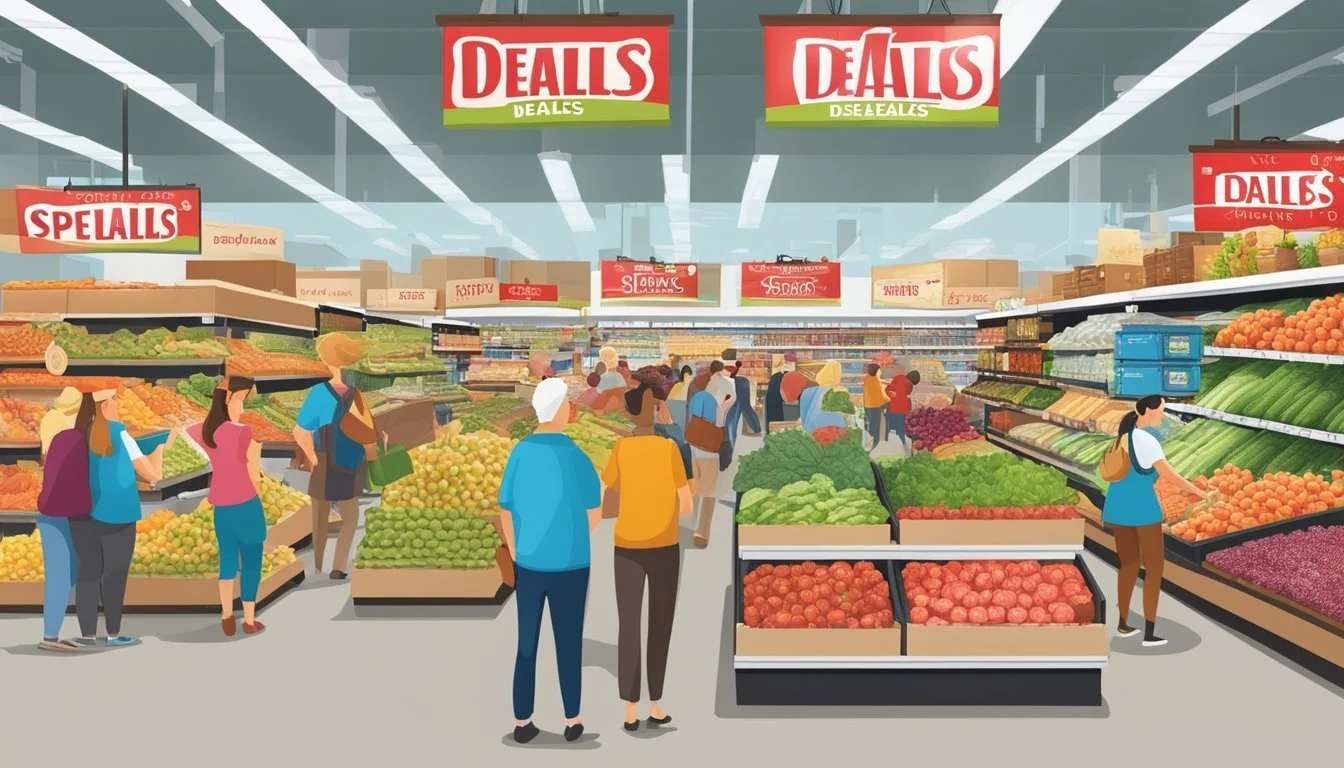Is Costco Cheaper Than Trader Joe's?
A Cost Comparison Analysis
Part of Our Grocery Store Guide with Details on Costco Prices and Trader Joe's Prices
When considering where to shop for groceries, two popular options often come into consideration: Costco and Trader Joe's. Each store offers a distinct shopping experience and has built a loyal customer base. Costco is a membership-based warehouse club known for selling products in bulk at competitive prices, which can lead to significant savings for those with the space to store large quantities. Their in-house brand, Kirkland Signature, is famous for its quality across a wide range of products.
Trader Joe's, by contrast, appeals to shoppers with its unique selection of groceries, including many private label products renowned for their quality and value. The stores typically have a smaller footprint, creating a more curated shopping experience. Trader Joe's also frequently stocks its shelves with new and interesting products, making each visit a potential discovery of new favorites. The comparison between Costco's bulk savings and Trader Joe's smaller-packaged products often comes down to the specific needs and preferences of the consumer.
By analyzing the prices and shopping experience offered by both Costco and Trader Joe's, consumers can make informed decisions on where to shop based on their individual needs. Those looking for bulk items and do not mind paying a membership fee might prefer Costco, while those looking for unique items, smaller quantities, and a no-membership shopping experience might lean towards Trader Joe's. Choosing the right store can ultimately save money, time, and align with shoppers' lifestyle choices.
Membership and Pricing Strategies
Costco and Trader Joe's employ distinct strategies regarding membership requirements and pricing models, key elements that directly impact a shopper's experience and potential savings.
Costco Membership Benefits and Costs
Costco operates on a membership model, requiring customers to pay an annual fee to access the store's products. The membership fees range in cost—basic "Gold Star" membership typically costs around $60, whereas the "Executive" membership is priced higher but offers additional benefits such as 2% rewards on certain purchases. The membership model allows Costco to maintain lower prices on items, as they sell in bulk and cater to customers looking for larger quantities and savings over time. This bulk-sale approach often translates into significant savings for consumers who buy frequently or have larger families, as the cost per unit tends to be lower compared to traditional retail pricing.
Trader Joe's Pricing Model
Trader Joe's does not require a membership for shopping at their stores. They focus on offering a wide array of unique and organic products at competitive prices without the need for a bulk purchasing model. This strategy appeals particularly to customers who shop for smaller households or prefer not to commit to the quantities required at Costco. Trader Joe's also offers numerous weekly deals and discounts on various products, thus ensuring shoppers can find value without an upfront membership fee. Their pricing approach allows for straightforward transaction without an additional layer of membership management.
Product Assortment and Brand Offerings
When comparing Costco and Trader Joe's, their distinct approach to product assortment and brand offerings is evident. Costco is renowned for its bulk products and exclusive Kirkland Signature brand, while Trader Joe's curates a unique selection of in-house brands.
Costco's Kirkland Signature and Bulk Offers
Costco excels in offering a wide variety of products in bulk quantities, catering to customers looking to stock up and save on their favorite items. The warehouse retailer's in-house brand, Kirkland Signature, provides high-quality alternatives to name-brand products often at a lower price point. For instance, Kirkland Signature offers an eight-pack of seven-ounce cans of albacore tuna, presenting better value compared to similar items at competitors on a per-unit basis.
The bulk offerings extend across various food categories:
Groceries: Everything from organic foods like blueberries and sweet potatoes to pantry staples like almonds and granola.
Fresh Food: An abundance of fresh fruits, vegetables, and bakery items are available in larger quantities.
Frozen Food: Comprehensive selection including a variety of meats like chicken and salmon, alongside frozen fruits and vegetables.
Household Essentials: Bulk buying options for items such as milk and bread, ensuring day-to-day needs are met more economically.
Trader Joe's Unique Brands and Selection
Trader Joe's stands out with its unique selection of exclusive Trader Joe's brand products. Their stores feature an eclectic mix that often includes specialty items and global flavors not commonly found in other grocery stores. While they don't specialize in bulk sales, their products are well-regarded for their quality and affordability. Trader Joe's regularly rotates its inventory to include seasonal offerings and new products, keeping the shopping experience fresh and interesting.
Notable product categories at Trader Joe's:
Food Products: A diverse assortment from peanut butter pretzels to wine, emphasizing unique flavors and combinations.
Organic and Fresh: A strong emphasis on organic offerings, including dairy like cheese and milk, as well as an array of fresh fruits and vegetables such as avocados and lemons.
Specialty Items: A variety of niche grocery items such as exclusive seasonings, coffee selections, and a variety of nuts.
Non-Grocery Assortment: Beside food, the selection includes non-edibles like flowers, contributing to the diverse shopping experience.
Quality and Variety Comparison
When comparing Costco and Trader Joe's, one must consider the quality and variety of their offerings, particularly in fresh produce, meats and seafood, and specialty foods.
Fresh Produce and Organic Selection
Trader Joe's produce section is known for its high-quality organic foods and fresh produce. Although the stores are smaller, they manage to offer a diverse range of organic fruits and vegetables, catering to health-conscious consumers. In contrast, Costco's vast warehouse spaces allow for a larger quantity of produce, but the focus on bulk items can limit the variety of organic selections available to shoppers.
Meat and Seafood Choices
Regarding meat and seafood, Costco typically offers a wide range of high-quality options in bulk packaging, which is ideal for larger households or those wanting to stock up. Their meat is often praised for its quality and price. Conversely, Trader Joe's may provide a smaller selection, but their products, including meat and seafood, are frequently highlighted for their quality and unique offerings, such as seasoned or marinated options that appeal to consumers seeking convenience.
In-Store Bakery and Specialty Foods
In the realm of bakery and specialty foods, Trader Joe's excels with an array of unique and gourmet items, including an impressive cheese selection that is both high in quality and reasonable in price. Their in-store baked goods are also notable for freshness and flavor variety. Costco's bakery offers large quantities of standard baked goods, often at a lower price per unit, appealing to those hosting events or feeding a crowd. However, it may lack the specialty range found at Trader Joe's.
Cost Considerations
When evaluating Costco and Trader Joe's for their cost-effectiveness, shoppers should consider both unit prices and their shopping patterns to make the most informed decisions about where to shop.
Comparing Unit Prices and Bulk Savings
Costco is widely recognized for its bulk buying options, which generally offer lower unit prices when compared to traditional retail sizes. For example, Costco’s Kirkland Signature Raw Almonds are priced at $12.99 for three pounds, equating to approximately $0.27 per ounce. In contrast, Trader Joe's offers smaller quantities, such as its Raw Almonds at $5.99 per pound, or $0.37 per ounce.
Bulk Savings at Costco:
Kirkland Signature Raw Almonds: $0.27/oz
Kind Bars: Up to $0.50 cheaper per bar
Trader Joe's does not specialize in bulk sales but provides competitive prices on many items, occasionally offering a lower price point on particular products, especially when factoring in their private label items.
Average Shopper's Spending Patterns
The average shopper may not always benefit from bulk savings if their consumption needs are lower. Shoppers at Trader Joe's tend to purchase what they need without the commitment to large quantities, which can lead to less waste and, in some cases, overall savings despite the higher unit price. The balance between quantity and spending should guide individuals shopping for groceries.
Spender Profiles:
Bulk Buyer: Prefers stocking up and values lower unit prices; finds more savings at Costco.
Selective Shopper: Buys in smaller quantities and might find better value at Trader Joe's, avoiding potential waste.
Shopping Experience and Services
When shopping at Costco and Trader Joe's, customers encounter different layouts and amenity offerings that define their shopping experience. Each store has distinct features aimed at meeting the needs of their clientele, whether through convenience or the range of services provided.
Store Layout and Shopping Convenience
Costco typically boasts a large warehouse-style layout, with an average of 147,000 square feet. It offers wide aisles and bulk items arranged in a straightforward fashion, catering to shoppers looking to stock up on goods. The shopping experience can be less personal due to the store's size but provides a one-stop-shop appeal. Additionally, samples are often available, enhancing the browsing experience.
On the other hand, Trader Joe's stores are smaller, averaging 8,000 to 15,000 square feet, making them more navigable for quick visits. Despite the smaller footprint, Trader Joe's is renowned for effectively stocking a diverse range of products, including many in-house brands, that cater to the day-to-day shopper.
Additional Services and Non-Food Items
Both stores offer extra services beyond groceries that amplify their shopping experience. Costco includes a food court, known for affordable and popular food options, as part of their additional amenities. It also provides a selection of clothing, jewelry, and electronics, making it a multipurpose shopping destination.
Trader Joe's focuses on the grocery segment but presents a warm shopping atmosphere with helpful staff and a focus on unique and gourmet food offerings, including their private labels. While Trader Joe's does not have a food court, it compensates with a curated selection of non-food items and personal care products often sourced from a variety of vendors.
Special Deals and Seasonal Offers
Costco and Trader Joe's both offer unique ways for shoppers to save through a variety of special deals and seasonal offers tailored to their business models.
Seasonal Specialties and Sale Offers
Trader Joe's rotates its selection seasonally, often introducing specialty items that cater to the current season, which could include anything from pumpkin-flavored autumn treats to summer barbecue essentials. These seasonal products are typically offered at competitive prices, enticing customers to try new flavors and products that are temporarily available. Sale prices for these specialties are set to offer savings, encouraging customers to purchase these limited-time foods.
Exclusive Deals for Members
Costco provides exclusive deals to its membership base, particularly on bulk purchases which offer significant savings. The warehouse retailer is renowned for its Kirkland Signature brand, which promises high-quality products at lower prices due to the bulk sale model. Membership at Costco not only grants access to these deals on Kirkland Signature products and other food items but also to various services and discounts outside the food department that are exclusive to members.
Consumer Preferences and Loyalties
Understanding consumer preferences and loyalties is crucial when comparing Costco and Trader Joe's. Shoppers exhibit clear tendencies on where and why they shop, influenced by factors such as price, product quality, and brand satisfaction.
Brand Loyalty and Product Satisfaction
Consumers often develop a strong allegiance to a brand or store based on the quality of the products offered. For instance, Trader Joe's has garnered a committed following owing to its unique, high-quality offerings and private label products that cannot be found elsewhere. The taste of their products, often perceived as above average, cements customer satisfaction and fosters brand loyalty.
Conversely, Costco's reputation for value with bulk purchases draws customers who prioritize savings and the shopping experience of buying large quantities. This, coupled with the perception of high-quality Kirkland Signature products, strengthens consumer confidence and loyalty to Costco.
Repeat Purchases and Customer Endorsements
The occurrence of repeat purchases is a strong indicator of customer satisfaction. Trader Joe's consistent quality and exclusive products result in repeat visits. Customers are often willing to endorse the brand through word-of-mouth, emphasizing the taste and quality of groceries.
On the other hand, Costco's lower price points for bulk items and cheaper options for similar or identical products encourage repeat purchases. Customers endorse Costco by highlighting the savings they accrue over time, which can portray Costco as the "winner" in terms of overall value. These endorsements are powerful tools that influence new shoppers to consider their shopping experience at Costco or Trader Joe's.
Conclusion
Examining the cost-effectiveness of shopping at Costco compared to Trader Joe's involves considering various factors, including prices, bulk purchasing, and membership fees.
Final Verdict: Which is Cheaper?
When it comes to finding the winner in cost savings, it largely depends on the shopping preferences and needs of the consumer. Costco tends to offer better deals on bulk purchases, which is ideal for larger households or those looking to stock up. However, a key consideration is the annual membership fee required to shop at Costco, which may offset potential savings for some shoppers.
On the other hand, Trader Joe's does not require a membership and offers competitive prices, particularly on a per-unit basis for smaller quantities. While their selection is more curated, consumers often find unique products at reasonable prices.
In summary, if a shopper prioritizes purchasing in larger volumes and is amenable to the membership model, Costco may provide more significant savings. Conversely, Trader Joe's is often the more accessible choice for customers seeking to buy in smaller quantities without the commitment of a membership fee. Therefore, there isn't a clear-cut cheaper option between the two—it will fluctuate based on individual shopping habits and needs.









